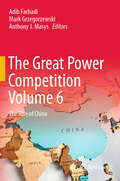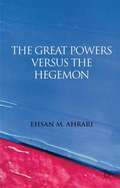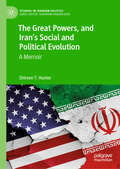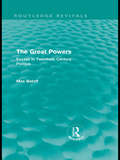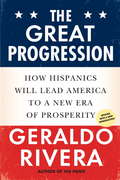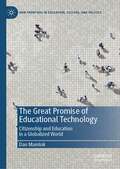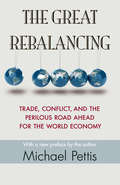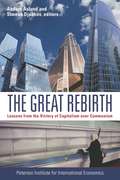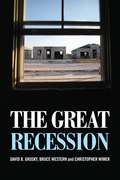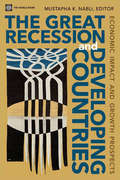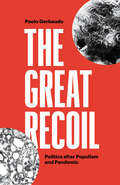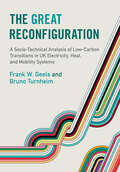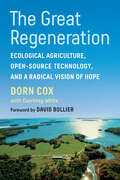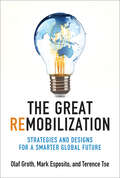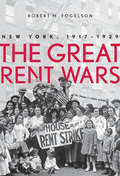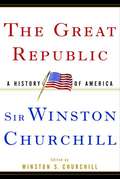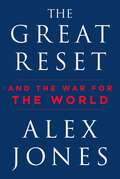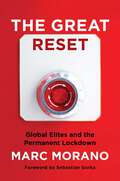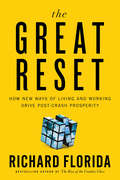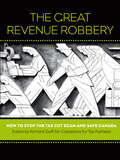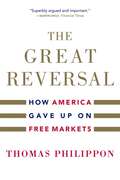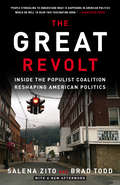- Table View
- List View
The Great Power Competition Volume 6: The Rise of China
by Anthony J. Masys Adib Farhadi Mark GrzegorzewskiChina’s Belt and Road Initiative (BRI) represents a monumental shift in the global power landscape. Through ambitious infrastructure projects and strategic economic investments, China has emerged as a formidable challenger to U.S. dominance in the modern Great Power Competition (GPC), leveraging a unique blend of soft power and non-interference policy. This distinctive strategy has allowed China to rapidly gain footholds in resource rich regions such as Central Asia-South Asia (CASA) and the Middle East, compelling the U.S. to rethink its foreign policy approach in response. Given China’s adept leveraging of soft power in these geostrategic regions, the critical question arises: how can the U.S. meet the nuanced challenges of the modern GPC? The Great Power Competition Volume 6: The Rise of China delves into China’s calculated rise, exploring how the BRI has captivated nations spanning pivotal regions, entrenching Chinese influence across critical sectors. This edited volume brings together distinguished global experts and thought leaders to provide comprehensive analyses of China’s expanding influence across economic, political, technological, and security domains. The collection of essays offers critical insights and recommendations for navigating the modern-day great power competition in an era defined by China’s ascent. The book highlights China’s BRI brand diplomacy and its strategic use of soft power and non-interference policy to reshape the geopolitical landscape. The authors’ final analyses underscore that in the modern era of the GPC, strategic competition and soft power are deeply intertwined.
The Great Powers and the International System
by Bear F. BraumoellerDo great leaders make history? Or are they compelled to act by historical circumstance? This debate has remained unresolved since Thomas Carlyle and Karl Marx framed it in the mid-nineteenth century, yet implicit answers inform our policies and our views of history. In this book, Professor Bear F. Braumoeller argues persuasively that both perspectives are correct: leaders shape the main material and ideological forces of history that subsequently constrain and compel them. His studies of the Congress of Vienna, the interwar period, and the end of the Cold War illustrate this dynamic, and the data he marshals provide systematic evidence that leaders both shape and are constrained by the structure of the international system.
The Great Powers versus the Hegemon
by Ehsan M. AhrariThis is a study of great power relations - China, India, and Russia - among themselves and with the hegemon - United States. Ahrari argues that the next decade may witness the emergence of a bipolar order where China's dominance in economics is certain; however, China will not seriously challenge the military dominance of the U. S.
The Great Powers, and Iran's Social and Political Evolution: A Memoir (Studies in Iranian Politics)
by Shireen T. HunterThis book is a personal narrative chronicling the life and experiences of Shireen Hunter, an Iranian woman who came of age during a transformative era in Iran’s history. It begins by spanning the tumultuous aftermath of World War II to the pivotal 1979 revolution, providing a poignant account of the profound impact of these historical events on the author’s life. The book delves into the multifaceted consequences of the reformist period that began in the 1960s. They enabled Shireen to enter the diplomatic service, but also cast a shadow of adversity over her family. Ultimately, the reforms contributed to internal divisions that ignited the 1979 revolution. The book then explores Shireen’s immigrant experience in the USA, where she assumed the role of an “ethnic expert” in the volatile arena of Middle East politics. It candidly recounts challenges she faced in maintaining intellectual integrity while earning a livelihood, highlighting the precariousness of being on the right side of controversial issues. The book does not offer definitive solutions to specific problems. Yet it resonates with contemporary international security and developmental challenges and offers insights that remain relevant in today’s complex global landscape. With its multifaceted narrative encompassing Iran’s social and political history, women’s studies, immigrant experiences, and a personal perspective on critical junctures in U.S.-Iranian relations, this book appeals to a diverse readership. It provides a unique window into “lived” experiences and analytical reflections of an individual who has traversed the intersections of history, identity, and diplomacy, offering invaluable insights into both past and present.
The Great Powers: Essays in Twentieth Century Politics (Routledge Revivals)
by Max BeloffThis re-issued work, first published in 1959, is a collection of essays by British historian Max Beloff, designed to help us to understand and interpret the political problems of the twentieth century. The essays are divided into three key areas: the challenges and limitations of interpretation from a historian's perspective, the appropriate scale for political activity and organisation in the modern world, and the emergence of the United States of America as the most powerful nation on the planet.
The Great Progression: How Hispanics Will Lead America to a New Era of Prosperity
by Geraldo RiveraIn this prophetic and profoundly hopeful book, Peabody and Emmy(r) Award-winning journalist Geraldo Rivera details the myriad ways Hispanics will help revitalize our declining economy, energize our distressed troops, and invigorate our national government. Featuring candid and revealing interviews with prominent Hispanics from Secretary of the Interior Ken Salazar to Los Angeles Mayor Antonio Villaraigosa to celebrities including Jennifer Lopez and David Archuleta, The Great Progression presents a fascinating look at the impact Hispanics are making on the social, economic, and political history of the United States. From those breaking boundaries in politics to visionary leaders in the business world to everyday people willing to serve, Hispanics' involvement in society is at an all-time high-and growing exponentially. Geraldo's fearless and judicious reporting addresses the nation's most critical issues under the Obama administration and enlightens those who seek real change and a new, more progressive American era.
The Great Promise of Educational Technology: Citizenship and Education in a Globalized World (New Frontiers in Education, Culture, and Politics)
by Dan MamlokThis book critically looks at the tensions between the promise to transform education through the use of digital technology and the tendency to utilize digital technology in instrumental and technical ways. The widespread use of digital technology has had a remarkable effect on almost every domain of human life. This technological change has caused governments, educational departments, and non-governmental organizations (NGOs) to recognize the need to develop educational plans that would support the social and the cultural changes that have occurred with the ubiquitous permeation of digital technology into our everyday lives. This book challenges common assumptions regarding digital technology and education, through critical exploration of educational policies, interviews, and class observations in the US and Israel. In doing so, the author sheds light on the possibilities of advancing digital citizenship under current educational policies.
The Great Rebalancing: Trade, Conflict, and the Perilous Road Ahead for the World Economy - Updated Edition
by Michael PettisHow trade imbalances spurred on the global financial crisis and why we aren't out of trouble yetChina's economic growth is sputtering, the Euro is under threat, and the United States is combating serious trade disadvantages. Another Great Depression? Not quite. Noted economist and China expert Michael Pettis argues instead that we are undergoing a critical rebalancing of the world economies. Debunking popular misconceptions, Pettis shows that severe trade imbalances spurred on the recent financial crisis and were the result of unfortunate policies that distorted the savings and consumption patterns of certain nations. Pettis examines the reasons behind these destabilizing policies, and he predicts severe economic dislocations that will have long-lasting effects.Demonstrating how economic policies can carry negative repercussions the world over, The Great Rebalancing sheds urgent light on our globally linked economic future.
The Great Rebirth: Lessons from the Victory of Capitalism over Communism
by Anders Åslund Simeon DjankovThe fall of communism transformed the political and economic landscape in more than two dozen countries across Europe and Asia. In this volume published on the 25th anniversary of the fall, political leaders, scholars, and policymakers assess the lessons learned from the "great rebirth" of capitalism and highlight the policies that were most successful in helping countries make the transition to stable and prosperous market economies. Also discussed in this book are examples of countries reverting to political and economic authoritarianism. The authors of these essays conclude that the best outcomes resulted from visionary leadership, a willingness to take bold steps, privatization of state-owned enterprises, and deregulation. Recent backsliding in Russia and Hungary has cast a shadow over the legacy of the transition a quarter century ago, however.This volume grew out of a two-day symposium of experts and practitioners reflecting on the past, present, and future of reform, held in Budapest, Hungary, on May 6–7, 2014.
The Great Recession
by David B. Grusky Bruce Western Christopher WimerOfficially over in 2009, the Great Recession is now generally acknowledged to be the most devastating global economic crisis since the Great Depression. As a result of the crisis, the United States lost more than 7.5 million jobs, and the unemployment rate doubled—peaking at more than 10 percent. The collapse of the housing market and subsequent equity market fluctuations delivered a one-two punch that destroyed trillions of dollars in personal wealth and made many Americans far less financially secure. Still reeling from these early shocks, the U.S. economy will undoubtedly take years to recover. Less clear, however, are the social effects of such economic hardship on a U.S. population accustomed to long periods of prosperity. How are Americans responding to these hard times? The Great Recession is the first authoritative assessment of how the aftershocks of the recession are affecting individuals and families, jobs, earnings and poverty, political and social attitudes, lifestyle and consumption practices, and charitable giving. Focused on individual-level effects rather than institutional causes, The Great Recession turns to leading experts to examine whether the economic aftermath caused by the recession is transforming how Americans live their lives, what they believe in, and the institutions they rely on. Contributors Michael Hout, Asaf Levanon, and Erin Cumberworth show how job loss during the recession—the worst since the 1980s—hit less-educated workers, men, immigrants, and factory and construction workers the hardest. Millions of lost industrial jobs are likely never to be recovered and where new jobs are appearing, they tend to be either high-skill positions or low-wage employment—offering few opportunities for the middle-class. Edward Wolff, Lindsay Owens, and Esra Burak examine the effects of the recession on housing and wealth for the very poor and the very rich. They find that while the richest Americans experienced the greatest absolute wealth loss, their resources enabled them to weather the crisis better than the young families, African Americans, and the middle class, who experienced the most disproportionate loss—including mortgage delinquencies, home foreclosures, and personal bankruptcies. Lane Kenworthy and Lindsay Owens ask whether this recession is producing enduring shifts in public opinion akin to those that followed the Great Depression. Surprisingly, they find no evidence of recession-induced attitude changes toward corporations, the government, perceptions of social justice, or policies aimed at aiding the poor. Similarly, Philip Morgan, Erin Cumberworth, and Christopher Wimer find no major recession effects on marriage, divorce, or cohabitation rates. They do find a decline in fertility rates, as well as increasing numbers of adult children returning home to the family nest—evidence that suggests deep pessimism about recovery. This protracted slump—marked by steep unemployment, profound destruction of wealth, and sluggish consumer activity—will likely continue for years to come, and more pronounced effects may surface down the road. The contributors note that, to date, this crisis has not yet generated broad shifts in lifestyle and attitudes. But by clarifying how the recession’s early impacts have—and have not—influenced our current economic and social landscape, The Great Recession establishes an important benchmark against which to measure future change.
The Great Recession
by Robert L. HetzelSince publication of Robert L. Hetzel's The Monetary Policy of the Federal Reserve (Cambridge University Press, 2008), the intellectual consensus that had characterized macroeconomics has disappeared. That consensus emphasized efficient markets, rational expectations, and the efficacy of the price system in assuring macroeconomic stability. The 2008-2009 recession not only destroyed the professional consensus about the kinds of models required to understand cyclical fluctuations but also revived the credit-cycle or asset-bubble explanations of recession that dominated thinking in the 19th and first half of the 20th century. These "market-disorder" views emphasize excessive risk taking in financial markets and the need for government regulation. The present book argues for the alternative "monetary-disorder" view of recessions. A review of cyclical instability over the last two centuries places the 2008-2009 recession in the monetary-disorder tradition, which focuses on the monetary instability created by central banks rather than on a boom-bust cycle in financial markets.
The Great Recession and Developing Countries: Economic Impact and Growth Prospects
by Mustapha K. NabliThe 2008-09 financial crisis, which originated in the United States and rapidly spread to the rest of world, resulting in the most severe and intense Great Recession since World War II, has posed new challenges for international policy coordination and the management of national economies. Questions are being raised about globalization, which has been a powerful engine of economic growth over the past three decades but exposes countries to more volatility and increases risk. What policies and reforms increase the resilience of developing economies to such external shocks? Which institutional arrangements and policy frameworks would allow them to respond most quickly and effectively? What role is there for international policy coordination and for emerging economies? The Great Recession and Developing Countries delves into 10 country case studies that explore growth during the precrisis boom, the effects of the crisis, policy responses, and recovery. Looking beyond the crisis, the volume undertakes projections of medium-term growth and explores the possible impact of the global crisis. The use of a common methodology in preparing the case studies facilitates cross-country comparisons and helps draw some useful lessons as well as identify areas where more study is needed. Although the case studies do not constitute a statistically representative global sample, they illustrate a broad range of experiences in the wake of the Great Recession--covering Brazil, China, Ethiopia, India, Malaysia, Mexico, the Philippines, Poland, Turkey, and Vietnam--and give insights on how developing countries can best prepare and respond to such crises. A synthesis chapter establishes the overall framework, provides a summary of the global crisis and its effects on the countries studied, and draws lessons from the 10 country studies,This book will be of particular interest to development practitioners, policy makers, and academics.
The Great Recoil: Politics after Populism and Pandemic
by Paolo GerbaudoWhat comes after neoliberalism?In these times of health emergency, economic collapse, populist anger and ecological threat, societies are forced to turn inward in search of protection. Neoliberalism, the ideology that presided over decades of market globalisation, is on trial, while state intervention is making a spectacular comeback amid lockdowns, mass vaccination programmes, deficit spending and climate planning. This is the Great Recoil, the era when the neo-statist endopolitics of national sovereignty, economic protection and democratic control overrides the neoliberal exopolitics of free markets, labour flexibility and business opportunity. Looking back to the role of the state in Plato, Machiavelli, Hobbes, Hegel, Gramsci and Polanyi, and exploring the discourses, electoral programs and class blocs of the nationalist right and socialist left, Paolo Gerbaudo fleshes out the contours of the different statisms and populisms that inform contemporary politics. The central issue in dispute is what mission the post-pandemic state should pursue: whether it should protect native workers from immigration and the rich against redistributive demands, as proposed by the right&’s authoritarian protectionism; or reassert social security and popular sovereignty against the rapacity of financial and tech elites, as advocated by the left&’s social protectivism. Only by addressing the widespread sense of exposure and vulnerability may socialists turn the present phase of involution into an opportunity for social transformation.
The Great Reconfiguration: A Socio-Technical Analysis of Low-Carbon Transitions in UK Electricity, Heat, and Mobility Systems
by Bruno Turnheim Frank W. GeelsThis book is intended for researchers, policymakers, and practitioners interested in the dynamics and governance of low-carbon transitions. Drawing on the Multi-Level Perspective, it develops a whole system reconfiguration approach that explains how the incorporation of multiple innovations can cumulatively reconfigure existing systems. The book focuses on UK electricity, heat, and mobility systems, and it systematically analyses interactions between radical niche-innovations and existing (sub)systems across techno-economic, policy, and actor dimensions in the past three decades. Comparative analysis explains why the unfolding low-carbon transitions in these three systems vary in speed, scope, and depth. It evaluates to what degree these transitions qualify as Great Reconfigurations and assesses the future potential for, and barriers to, deeper low-carbon system transitions. Generalising across these systems, broader lessons are developed about the roles of incumbent firms, governance and politics, user engagement, wider public, and civil society organisations. This title is also available as Open Access on Cambridge Core.
The Great Regeneration: Ecological Agriculture, Open-Source Technology, and a Radical Vision of Hope
by Dorn CoxIn the age of climate change, food scarcity, and increasing industrialization, can a few visionary farmers find global solutions through technology and create networked, open-source regenerative agriculture at a truly transformative scale?In The Great Regeneration, farmer-technologist Dorn Cox and author-activist Courtney White explore unique, groundbreaking research aimed at reclaiming the space where science and agriculture meet as a shared human endeavor. By employing the same tools used to visualize and identify the global instability in our climate and our communities—such as satellite imagery—they identify ways to accelerate regenerative solutions beyond the individual farm.The Great Regeneration also explores the critical function that open-source tech can have in promoting healthy agroecological systems, through data-sharing and networking. If these systems are brought together, there is potential to revolutionize how we manage food production around the world, decentralizing and deindustrializing the structures and governance that have long dominated the agricultural landscape, and embrace the principles of regenerative agriculture with democratized, open-source technology, disseminating high-quality information, not just to farmers and ranchers, but to all of us as we take on the role of ecosystem stewards.In this important book, the authors present a simple choice: we can allow ourselves to be dominated by new technology, or we can harness its potential and use it to understand and improve our shared environment. The solutions we need now, they write, involve a broader public narrative about our relationship to science, to each other, and to our institutions. And we all need to understand that the choices made today will affect the generations to come. The Great Regeneration shows how, together, we can create positive and lasting change.
The Great Remobilization: Strategies and Designs for a Smarter Global Future
by Olaf GrothHow the turmoil of recent years gives leaders an unprecedented opportunity to redesign global strategies and systems and to remobilize toward a smarter, more resilient, and equitable future.How can leaders faced with tremendous global upheaval create more resilient and trustworthy systems? In The Great Remobilization, Olaf Groth, Mark Esposito, and Terence Tse (along with research partner Dan Zehr) diagnose tectonic shifts in the global economy with an eye toward designing a smarter &“operating system&” for the world. Through their FLP-IT (forces, logic, phenomena, impact, and triage) framework for strategic leadership, the authors chart a path forward, providing guidance for a new breed of &“design activist leader.&” Focusing on key tectonic shifts they call the Five Cs—COVID and pandemic management, the cognitive economy and crypto, cybersecurity, climate change and carbon management, and China—they examine the implications that new forces and logics will have on countries, organizations, and individuals.Drawing from one hundred interviews and conversations with top-level executives, entrepreneurs, policymakers, diplomats, generals, scholars, and other leading experts from around the world, the authors show how to create new inclusive visions with the aim of rebuilding the trust that will allow for both human and economic growth. Insightful and forward-thinking, The Great Remobilization powerfully illustrates the rare opportunity that we have in this historic moment to actively redesign our fragile, overpressurized global systems and develop new strategies and leadership approaches for the future. Authored by three scholar-practitioners, their synthetic perspectives and insights are at once rooted in deep research and focused on relevance for leaders and their organizations.
The Great Rent Wars
by Robert M. FogelsonWritten by one of the country’s foremost urban historians, The Great Rent Wars tells the fascinating but little-known story of the battles between landlords and tenants in the nation’s largest city from 1917 through 1929. These conflicts were triggered by the post-war housing shortage, which prompted landlords to raise rents, drove tenants to go on rent strikes, and spurred the state legislature, a conservative body dominated by upstate Republicans, to impose rent control in New York, a radical and unprecedented step that transformed landlord-tenant relations. The Great Rent Wars traces the tumultuous history of rent control in New York from its inception to its expiration as it unfolded in New York, Albany, and Washington, D. C. At the heart of this story are such memorable figures as Al Smith, Fiorello H. La Guardia, and Oliver Wendell Holmes, as well as a host of tenants, landlords, judges, and politicians who have long been forgotten. Fogelson also explores the heated debates over landlord-tenant law, housing policy, and other issues that are as controversial today as they were a century ago.
The Great Republic: A History of America
by Winston S. ChurchillThe Great Republic is Sir Winston Churchill's personal vision of American history, from the arrival of the first European settlers to the dawn of the Cold War, edited by his grandson, the historian and journalist Winston S. Churchill. The book is a magnificent retelling of the American story, including some of the best short histories of the Revolutionary War and the Civil War ever written. The bulk of this book, America's history up to the twentieth century, has until now been found only within Churchill's much longer four-volume A History of the English-Speaking Peoples, for which he was awarded the Nobel Prize for literature in 1953. The chapters on America from that larger work have been knit together into a whole, and to them Winston S. Churchill has added essays and speeches of his grandfather's, many never before published in book form, to bring the book up to the mid-twentieth century. Sir Winston Churchill's renown as a statesman has tended to overshadow his great gifts as a historian. History was the work of his heart's delight, and few subjects were dearer to him than America. His mother, Jennie Jerome, was American, and all of his life Churchill harbored a deep warmth of feeling for this country and a sense of its special destiny. With fondness, he called America "the Great Republic," and in his later years he trained all of his powers on the history this book contains. The Great Republic is stirring in its sweep and breathtaking in the flash and vigor of its insights. Only an author with Sir Winston Churchill's special perspective on America, his experience as a leader and strategist, his intimacy with the responsibilities of guiding a nation, and his great gifts as a narrative historian could have written a book that lays out America's history, character, and destiny with this book's special brilliance. Statesman and historian Sir Winston Churchill led Great Britain through the Second World War as prime minister. He was the author of forty-two books, including the six-volume history The Second World War, which was chosen by the National Review as the nonfiction "book of the century. "
The Great Reset: And the War for the World
by Alex JonesIn The Great Reset: And the War for the World, the most controversial man on earth Alex Jones gives you a full analysis of The Great Reset, the global elite's international conspiracy to enslave humanity and all life on the planet. If you really want to know what&’s happening in the world, this is the one book you must read now. Alex Jones is the most censored man on the planet and you should ask yourself why that is. There is a powerful authoritarian takeover in process that is seeking to capture the entire human system and turn it into an artificial factory farm controlled system. We are in a war for the future of the world. In this book, you will hear from the world&’s elites, from their own mouths, what they are planning for you and your families and you will learn what you can do to fight it.From central bankers, corporate billionaires, and corrupted government officials, global elites have been organizing a historic war on humanity under a trans-humanist, scientific dictatorship. Alex Jones was the first major figure to expose the World Economic Forum&’s agenda. He has dedicated the last 30 years of his life to studying The Great Reset, conducting tens of thousands of interviews with top-level scientists, politicians, and military officials in order to reverse engineer their secrets and help awaken humanity. The Great Reset: And the War for the World chronicles the history of the global elites' rise to power and reveals how they&’ve captured the governments of the world and financed The Great Reset to pave the way for The New World Order. Once dubbed a conspiracy theory, but now openly promoted by the most powerful corporations and governments, The Great Reset is a planned attempt to redistribute all the world&’s wealth and power into the hands of banks, corporations, billionaires, and The World Economic Forum. If you read one book in a lifetime, this is it. In The Great Reset: And the War for the World, you will discover from the self-appointed controllers of the planet in their own words, their plan for what they call the final revolution, or The Great Reset. The only way this corporate fascist conspiracy can succeed is if the people of the world are not aware of it. And this book lays out their sinister blueprint and how to stop it. While many great books have been written to help awaken people to this sinister agenda, no author has ever spent as much time and research on The Great Reset as Alex Jones. The Great Reset: And the War for the World is the undisputed trailblazer for understanding what&’s happening and how to stop it.
The Great Reset: Global Elites and the Permanent Lockdown
by Marc MoranoHere is the antidote to the left's sinister push to use a worldwide crisis to infuse our lives with the values of collasal statism and dystopian self-hatred, all accelerated by the duplicitous manipulation of the recent pandemic. From the nationally best-selling author of The Politically Incorrect Guide to Climate Change.Welcome to 2030. I own nothing, have no privacy, and life has never been better. This is the vision of the Great Reset, according to globalist leaders. While proponents of the Great Reset push slogans like &“Build Back Better,&” &“The Fourth Industrial Revolution,&” and &“A New Normal,&” the Reset is nothing short of a rebranded Soviet system, threatening to strip away property rights, restrict freedom of movement and association, and radically reshape our diets and way of life. In The Great Reset: Global Elites and the Permanent Lockdown, bestselling author and ClimateDepot.com publisher, Marc Morano, unveils the origins of the Great Reset, who is behind it, how it is being implemented, and how COVID-19 and the alleged &“climate emergency&” accelerated its imposition on the United States. Packed with telling statistics and damning quotes, The Great Reset is the essential handbook for the public, the media, and activists on how to critically analyze and expose the tyrannical policies silently strangling our liberties today.
The Great Reset: How New Ways of Living and Working Drive Post-Crash Prosperity
by Richard FloridaA study of how the economic meltdown of 2008–09 was a chance to reset and what our economy, society, and geography will look like in the future.We’ve weathered tough times before. History teaches us that periods of “creative destruction,” like the Great Depression of the 1930s, also present opportunities to remake our economy and society and to generate whole new eras of economic growth and prosperity. In The Great Reset, bestselling author and economic development expert Richard Florida provides an engaging and sweeping examination of these previous economic epochs, or “resets,” while looking toward the future to identify the patterns that will drive the next Great Reset and transform virtually every aspect of our lives. He distills the deep forces that alter physical and social landscapes—how and where we live, how we work, how we invest in individuals and infrastructure, how we shape our cities and regions—and shows the ways in which these forces, when combined, will spur a fresh era of growth and prosperity, define a new geography of progress, and create surprising opportunities for all of us.Praise for The Great Reset“Provocative and intelligent. . . . Well worth reading as a starting point for the future that’s coming our way whether we’re ready or not.” —Miami Herald“A thoughtful, generally hopeful assessment of where we are now, how we got here—and how we can rebuild in the future.” —BizEd Magazine
The Great Revenue Robbery: How to Stop the Tax Cut Scam and Save Canada
by Canadians for Tax FairnessAny attempt to restore responsible environmental policies, revive and expand our social programs, rebuild our crumbling infrastructure, and boost our flagging economy will be inadequate unless we also address the need to increase governments’ fiscal capacity. The tax system can also play a key role in closing the gap between rich and poor––a gap that is undermining the health of our economy and threatening damage to our democracy. Until recently, many progressive groups, including progressive political parties, have shied away from advocating for tax fairness and tax reform, fearing that the issue is political dynamite. Right wingers have encountered little opposition to their calls for deep tax cuts, especially for the rich and for corporations. But the tide is turning. Public opinion polls tell us that faced with growing inequality and cutbacks to government programs, Canadians now strongly support tax fairness, including higher taxes on the rich and on corporations. The Great Revenue Robbery is a collective effort to stimulate much-needed discussion about how tax policy can help rebuild our social programs, reduce the gap between rich and poor, restore environmental responsibility, and revitalize our country’s democracy.
The Great Reversal
by David TabachnickEvery day, we are presented with new technologies that can influence human thought and action, such as psychopharmaceuticals, new generation performance enhancing drugs, elective biotechnology, and gastric bypass surgery. Have we let technology go too far in this respect? In The Great Reversal, David Edward Tabachnick contends that this question may not be unique to contemporary society. Through an assessment of the great works of philosophy and politics, Tabachnick explores the largely unrecognized history of technology as an idea.The Great Reversal takes the reader back to Aristotle's ancient warning that humanity should never allow technical thinking to cloud our judgment about what makes for a good life. It then charts the path of how we began to relinquish our deeply rooted intellectual and practical capacities that used to allow us to understand and regulate the role of technologies in our lives. As the rise of technology threatens our very humanity, Tabachnick emphasizes that we still may have time to recover and develop these capacities - but we must first decide how far we want to allow technology to determine our existence and our future.
The Great Reversal: How America Gave Up on Free Markets
by Thomas PhilipponAmerican markets, once a model for the world, are giving up on competition. Thomas Philippon blames the unchecked efforts of corporate lobbyists. Instead of earning profits by investing and innovating, powerful firms use political pressure to secure their advantages. The result is less efficient markets, leading to higher prices and lower wages.
The Great Revolt: Inside the Populist Coalition Reshaping American Politics
by Salena Zito Brad ToddStandout syndicated columnist and CNN contributor Salena Zito, with veteran Republican strategist Brad Todd, reports across five swing states and over 27,000 miles to answer the pressing question: Was Donald Trump's election a fluke or did it represent a fundamental shift in the electorate that will have repercussions--for Republicans and Democrats--for years to come.The history of the American electorate is not a litany of flukes; instead it is a pattern of tectonic plate-grinding, punctuated by a landscape-altering earthquake every generation or so. Donald Trump's electoral coalition is smashing both American political parties and its previously impenetrable political news media.The political experts called the 2016 election wrong and in the wake of the 2016 election surprise, the experts have continued to blow it - looking to predict the coming demise of the President without pausing to consider the durability of the trends and winds that swept him into office. The Great Revolt delves deep into the minds and hearts of the voters the make up this coalition. What emerges is a group of citizens who cannot be described by terms like "angry," "male," "rural," or the often-used "racist." They span job descriptions, income brackets, education levels, and party allegiances. What unites them is their desire to be part of a movement larger than themselves that puts pragmatism before ideology, localism before globalism, and demands the respect it deserve from Washington. Zito and Todd have traveled on over 27,000 miles of country roads to interview more than 300 Trump voters in 10 swing counties. What they have discovered is that these voters were hiding in plain sight--ignored by both parties, the media, and the political experts all at once, ready to unite into the movement that spawned the greatest upset in recent electoral history. Deeply rooted in the culture of these Midwestern swing states, Zito and Brad Todd reframe the discussion of the "Trump voter" to answer the question: What next?
